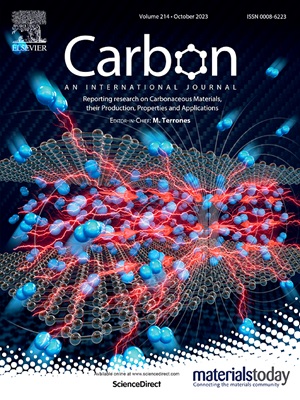Molten aluminum-mediated production of carbon nanomaterials from hydrocarbon streams: Morphology and energy storage
IF 10.5
2区 材料科学
Q1 CHEMISTRY, PHYSICAL
引用次数: 0
Abstract
The sustainable synthesis of carbon nanomaterials (CNMs) from hydrocarbons has gained significant attention for their potential in energy storage applications. In this work, we investigate the morphology, properties, and applications of carbon nano-onions (CNOs) produced by a catalyst-free molten aluminum-based reactor. This reactor decomposes hydrocarbon feedstock into high-quality CNOs while simultaneously generating hydrogen gas, a valuable green energy byproduct (H2 gas), and preventing the emission of greenhouse gases. The synthesized CNOs were extensively characterized using SEM, TEM, XRD, Raman spectroscopy, and TGA analysis, revealing their graphitic, defect-rich structure and good thermal stability. Electrochemical studies demonstrated the efficacy of CNOs as conductive additives in conventional supercapacitors, achieving higher capacitance and cycling stability compared to commercial alternatives. Furthermore, the CNOs were successfully employed as active materials for printed flexible micro-supercapacitors (MSCs), exhibiting excellent electrochemical performance, mechanical flexibility, and long-term stability. Notably, these MSCs operated effectively without metal current collectors, offering a scalable and cost-effective solution for flexible energy storage devices. The results highlight the promise of hydrocarbon-derived CNOs as sustainable materials for advanced energy storage technologies.
熔融铝介导的碳纳米材料从碳氢化合物流的生产:形态和能量储存
碳氢化合物可持续合成碳纳米材料(CNMs)因其在储能方面的应用潜力而受到广泛关注。在这项工作中,我们研究了由无催化剂熔融铝基反应器生产的碳纳米洋葱(CNOs)的形态、性质和应用。该反应器将碳氢化合物原料分解成高质量的CNOs,同时产生宝贵的绿色能源副产品氢气(H2气体),并防止温室气体的排放。采用SEM、TEM、XRD、拉曼光谱和TGA等手段对合成的CNOs进行了表征,结果表明其石墨化、缺陷丰富、热稳定性好。电化学研究证明了CNOs作为导电添加剂在传统超级电容器中的有效性,与商业替代品相比,它具有更高的电容和循环稳定性。此外,CNOs还被成功地用作印刷柔性微型超级电容器(MSCs)的活性材料,具有优异的电化学性能、机械柔韧性和长期稳定性。值得注意的是,这些MSCs在没有金属集流器的情况下有效运行,为灵活的储能设备提供了可扩展且经济高效的解决方案。这一结果突显了碳氢化合物衍生的CNOs作为先进储能技术的可持续材料的前景。
本文章由计算机程序翻译,如有差异,请以英文原文为准。
求助全文
约1分钟内获得全文
求助全文
来源期刊

Carbon
工程技术-材料科学:综合
CiteScore
20.80
自引率
7.30%
发文量
0
审稿时长
23 days
期刊介绍:
The journal Carbon is an international multidisciplinary forum for communicating scientific advances in the field of carbon materials. It reports new findings related to the formation, structure, properties, behaviors, and technological applications of carbons. Carbons are a broad class of ordered or disordered solid phases composed primarily of elemental carbon, including but not limited to carbon black, carbon fibers and filaments, carbon nanotubes, diamond and diamond-like carbon, fullerenes, glassy carbon, graphite, graphene, graphene-oxide, porous carbons, pyrolytic carbon, and other sp2 and non-sp2 hybridized carbon systems. Carbon is the companion title to the open access journal Carbon Trends. Relevant application areas for carbon materials include biology and medicine, catalysis, electronic, optoelectronic, spintronic, high-frequency, and photonic devices, energy storage and conversion systems, environmental applications and water treatment, smart materials and systems, and structural and thermal applications.
 求助内容:
求助内容: 应助结果提醒方式:
应助结果提醒方式:


